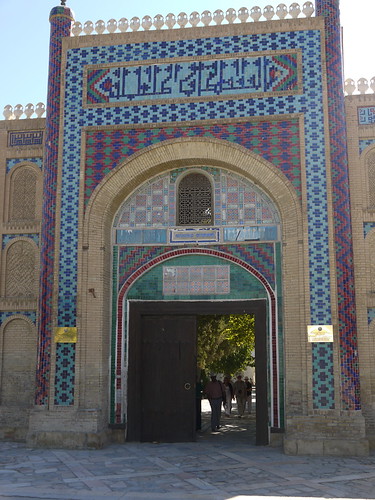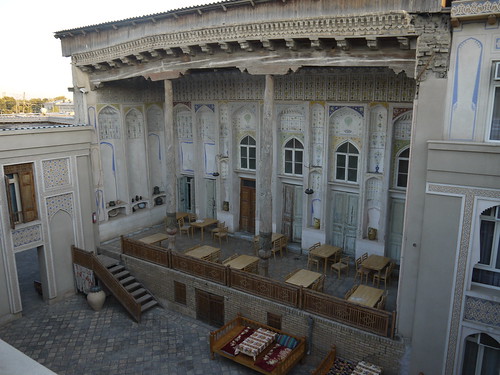In September 2011 I was lucky enough to spend two weeks in Uzbekistan. It is a fascinating place of many contradictions. The historic cities of Bukhara and Samarkand have Tajik majority populations, rather than Uzbek. The country is nominally Islamic yet vodka is consumed with great enthusiasm and ham seems to be readily available. The Aral sea, once beautiful and a major source of food for the country is famous for more or less disappearing.
 |
| Entrance to the Palace of the last Emir of Bukhara |
My favourite place has to be Bukhara. The city is filled with well preserved or carefully restored mosques and madrasses from hundreds of years ago. Most of these are now either museums or act as centres for the production and sale of arts and crafts. Uzbek arts include silk and carpets, but most famously the silk, cotton or mixed fibre suzanis - beautiful wall hangings with different patterns for each region. Quality varies and most traders are not pushy and will give honest advice about the fabrics used. My own experience was not only that there was no pressure to buy, but that some traders were exceptionally trusting - I asked if I could return to complete my purchase, needing to go to the bank, but was trusted to take my suzani away and bring the money back the next day. The trader used the deposit I left to touch every other item in his shop - the first dollar of the day is expected to bring luck and more sales.
Bukhara is a riot of colour and the former mosques and madrases are varying combinations of blues, purples, greens, reds and yellows. The historical heart of the city is Lyab-i-Hauz which has a pool and a series of chaikhana or open air tea houses where gallons of green tea are consumed every day. Chaikhanas can be found across Uzbekistan and are raised wooden beds, usually designed to seat four people (normally men) with space to lounge, drink, eat, chat and play backgammon.
Uzbeks are tea drinkers. Coffee devotees might be a little disappointed with the nescafe that is offered in many establishments, but whilst in Bukhara I paid a couple of visits to Silk Road Spices. Here, as well as saffron, ginger and many other teas, you can drink real coffee with cardamon accompanied by a plate of sticky local sweets. Not only is the tea and coffee great, but the cool convivial atmosphere is extremely relaxing and you can while away an hour or so over a few cups. The owners claim to have been in the tea business since 1400 and it is not difficult to imagine weary travellers stopping off here whilst traveling along the Silk Road.
 |
| Silk Road Spices Tea House |
For another "relaxing" experience, intrepid travellers might like to try the hamam opposite Silk Road Spices. Not normally my cup of tea, my guide persuaded me to visit the hamam for a massage. An experience it certainly was. The routine begins with some serious sweating in the steam room followed by a soap and warm water wash before the massage which seemed to involve being twisted and folded into the most amazing positions that even the world's most accomplished contortionists would envy. Then, a short recovery before the masseur walked on my back which was followed by a rub down with spices - beware, that means ginger and honey and it is HOT! Then it was another short sweat before a warm wash and a couple of buckets of freezing cold water to rinse all the sweat away and invigorate the customer. I was intrigued by the back walking element - it wasn't painful at all and the masseur was experienced enough to be able to talk to me whilst he did it. I found talking a little more difficult than he did! There was free green tea afterwards in the hamam's tea room. I had several cups.
My hotel in Bukhara was very close to the Lyab-i-Hauz and carried the same name. The hotel is in the 19th century former home of a Jewish merchant, and has been subject to sensitive restoration. Breakfast is served on a beautiful terrace overlooking an open courtyard and the dining room still features Hebrew inscriptions on the walls. Bukhara was once home to a large Jewish community, many of whom were involved in the silk trade before Soviet times. Following independence large numbers left for Israel but about 350 remain - enough to support two working synagogues and a Jewish day school. All can be visited.
 |
| Courtyard of the Lyab-i-Hauz Hotel |
 |
| Detail, Nadir Divan Beghi Madrassa |
Whilst on the subject of figurative art, just in front of the Madrassa, there is a sculpture of the story-teller and joker Nasreddin Effendi or Nasreddin Hadji. This comic figure is claimed by many Turkic peoples but is especially loved in Uzbekistan and many figurines of him with his donkey are offered for sale.
Away from the large monuments, I visited the much simpler but also beautiful Chor Minor. Chor Minor means four minarets and legend has it that the man who had this built had four daughters each with a particular personality. Hence the design. Technically none of the towers are minarets since they have no terrace and so there can be no call to prayer.
 |
| Chor Minor |
Away from the main tourist areas the backstreets of Bukhara are extremely quiet, dusty and at first glance deserted. However, persevere, go a little deeper into the network of streets and you will catch glimpses of once beautiful courtyards, smell home cooking and see old people and small children sitting on back steps or playing in the street - many will nod or smile or say hello to you. All will be happy to give directions if you are lost. This is an Uzbek tradition and in Samarkand when I was confused about the way back to the main drag, an elderly woman gathered up her grand daughter and led me for 15 minutes back to the centre of the city before leaving with a smile and a waive.
It was on the roof of an old house in a narrow Bukharan back street that I came across Minzifa - a small restaurant where I had the meal I enjoyed most in Uzbekistan. Uzbekistan is a meat eaters paradise, but at Minzifa I managed to find a vegetarian version of the ubiquitous "plov" a rice based dish similar to the pilaf you might be familiar with from other eastern countries. I was able to enjoy this at my own small table, watching the sunset and listening to Chopin being played on the restaurant's piano with the streets below descending into almost total darkness. Ah, Bukhara.
You can see more pictures of Bukhara and other cities in Uzbekistan here.

No comments:
Post a Comment